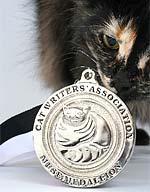 |
|||||||||||||||||||
|
|

We are the proud winners of the 2006 - 2009 winner of the Muse Medallion for Online Magazine by The Cat Writers? Association in their annual Communications Contest! (Photo courtesy of Weems Hutto).
On November 17, 2007 Felinexpress.com was honored to receive The President's Award by the Cat Writers' Association. We are very proud to have earned this distinction and will continue to provide quality information for all cat lovers.
Felinexpress.com Home > Cat Health > High-Rise Syndrome |
High-Rise Syndrome
High rise syndrome, sounds like an affliction for people living in penthouses doesn’t it? Actually, high rise syndrome affects cats that fall from two stories or higher. Although most cats are lithe and agile unless they can see where they are falling, gauge the distance and prepare themselves, they do not always land on their feet. incidence of cats falling from high-rises has become so prevalent the term high-rise syndrome was coined by urban vets.
Studies show that if a cat falls from the seventh floor of a building, this cat has a thirty percent less chance of surviving than a cat that falls from the twentieth floor. The cat needs time to realize what happened, achieve maximum terminal velocity and relax instead of tensing up. Allowing it to correct its body language in order to minimize damage. When the cat realizes it is in a situation it can’t control, it will attempt to flee, even while falling. This twists the body of the cat into unnatural shapes as the cat fights the pull of gravity causing grievous injury as the end result.
In New York, high-rise syndrome is a common problem treated in the emergency animal hospitals. Injuries from these falls can range from broken jaws, to cranial trauma, broken limbs, crushing injuries, and shock or retina detachment..
During the summer months especially, renters in high rise buildings open up their patio doors and windows to escape the stifling heat. Cats routinely perch on fire escapes and railings, a poor substitute for trees which cats are designed to climb. Their claws make little impact on metal offering them little protection against falling.
In Europe, screens on windows are rare. Instead, ornamental bars or wrought iron decorative grills take the place of screens. The high-rise buildings in Europe do not have windows that open from the bottom, for the safety of the occupants. The windows open vertically on slides with a locked bottom half.
Windows not protected are an open invitation for a kitten or a cat to tempt fate. Flying insects, passing birds, intriguing scents, movement or even just curiosity or boredom can entice a cat to leave the comfort of its home and leap out into the world.
If your cat is lucky enough to survive a high fall, he should be carefully and gently picked up. Use something like a flat cardboard section to place underneath him, wrap him in a blanket or towel and rushed him to the vet immediately. A thorough physical exam, blood work, x-rays and urine-analysis should be performed.
The best way to prevent high-rise syndrome is to screen or block all your windows. You can use pet-proof screening, baby gates, or flexible, decorative, plastic trellis sheets. Simply measure the space, cut the sheeting to fit, place four screws one at each corner of the window and bend the sheeting to fit in place. Make sure the holes in the trellis sheet are not large enough so that a kitten or cat could get his head stuck in them. Balconies unless fully screened or blocked should be off-limits to your cat at all times.
More cat breeds |
|
? Copyright 2006-2010 Felinexpress.com, All Rights Reserved
Privacy Statement - Disclaimer - About Me


